- Home
- Carrie Ryan
The Dead and Empty World Page 2
The Dead and Empty World Read online
Page 2
As he explains I bite my teeth together as hard as possible, wondering if I can break them—break everything and be done with it.
“I’ll go overboard, if you want,” he offers. In the darkness his voice has no body, no infection. It just is.
“But then you’ll turn into one of those things,” I tell him.
His breath shakes. “I’m going to turn into one of those things no matter what,” he says.
I push my fingers into my eyes, trying to poke them hard enough to bring tears because it’s the only way I can think of to unleash the searing pain inside. “Is that what you want?” I ask him.
“If I stay on this raft and turn, I’ll go after you,” he finally says. He pauses and in the emptiness our hearts keep beating. “I don’t want that,” he adds softly.
“So you think you can take me?” I ask him.
He doesn’t laugh, not really. It was a lame joke anyway, but I do hear him exhale a little harder as if he’d thought about laughing. “You have to promise me you’ll throw me over when it happens,” he finally says. “Promise me you’ll make me sink.”
I press my fingers harder against my eyes.
“Promise me.” His voice is urgent.
I shake my head. “I promise,” I mutter.
“I think Nancy had a little crush on you,” I tell him. It’s a thick soupy day, taunting us with rain and I’m organizing our water bottles to catch what I can. My mouth tries to salivate at the thought of it, cool and wet, sliding down my throat, filling every dry space inside me.
“I hope so, since she’s the one who bit me.” He’s leaning back in the shade of the canopy, shirt off now that I know his secret. I can’t look at him without glancing at the bite festering along his ribs. It’s like he’s proud of it, forcing us both to deal with it.
And then I realize what his words mean. “So you knew.” I don’t ask it as a question. I turn to face him. “If she’s the one who bit you, you knew about everyone else. Francis, Nancy and the others.”
“Why do you think I told you we shouldn’t wait for them?” he asks. Red streaks along his skin, marking every vein through his body with infection. I can almost feel the heat of it radiating along the rubber of the raft.
“Then why did you keep asking to go back if you knew?”
He shrugs, stares at his hands. “I wanted to be wrong. Doesn’t matter now, I guess.”
And he’s right. We lost sight of the last raft two days ago.
His hands are hot as he grabs for me. He’s gasping for breath and at first I think he’s turned, gurgling on moans, but then I realize he’s trying to say my name. “Get up,” he says, shaking me, but his muscles are weak from so many days of disuse and I’m still much larger and stronger than he is.
“Get up,” he prods again.
He shoves something into my hand, the lanyards that lashed the flap of the canopy shut. “Tie me up,” he says. “It’s time. Tie me up, sink me.”
It’s been harder and harder for me to surface from sleep and I struggle to understand what Jeremy’s saying. He’s wheezing now as he takes my hands, wraps my fingers around the ropes, pulls them tight along his wrists and elbows.
His skin’s dry and cracked and I try to blink the salt from my eyes so I can focus on what’s going on. It’s dark in the little raft, pitch-black swallowing us everywhere with just the tiny hiccups of the alert beacon flashing.
-flash-
Jeremy knotting the ropes. Using his teeth to tighten them.
-flash-
Me winding them around his torso, tucking up his knees.
-flash-
Jeremy’s eyes glassy and bright. His chest barely moving.
-flash-
I don’t know what to say. What to do. What to tell him.
-flash-
I slip my fingers into his. “I’m sorry, Jeremy.”
-flash-
He’s nothing.
-flash-
Dead eyes. Still heart.
-flash-
Waves tilt and whirl as his body becomes a shell.
-flash-
I breathe in. Hold it.
-flash-
-flash-
-flash-
I exhale.
And before the light can flash again he explodes, straining and struggling.
I see the perfectly straight teeth, the gleaming white as he tries to lunge for me.
As he snaps at the air.
Screaming, I throw myself across the raft. Pushing and forcing myself back. Wishing the walls could absorb me. Keep me safe. His moans are like growls, guttural and wet. He’s insane with what looks like agony and rage and a desire so intense I can smell it.
Beneath me the entire raft bucks and swirls, his movements teetering us around, his feet ripping at the canopy overhead as he tries to gain his balance, tries to push himself closer to me.
I can’t get near him, can only watch as he pulls and pops against the ropes. Can only hear the strain on his joints, the snap of his wrist breaking apart under the wrenching jolts. It’s too much. I can’t stand it, can’t be near him anymore. Can’t see him like this.
I dive through the opening in the canopy into the night, letting the waves close over my head until I can’t hear, can’t see, can’t forget as the raft twists and shudders above me.
“Do you believe in God?” I ask Jeremy. Water pools around the divot in the raft where I’m crouching and I’ve pulled open the canopy, hoping the sun will burn it away so that my poor chaffed skin can find relief.
Jeremy bucks against the soggy ropes holding him tight. I’ve lashed him to the other side of the raft and used strips of my shirt to tie his mouth shut. He still manages to moan, deep nasal sounds that reverberate through the raft so that I’m always feeling them even when I shove my hands to my ears.
I tried to push him overboard, I swear. But I just couldn’t do it. I couldn’t let go of him.
He’s all I have left. I couldn’t drift away from him on the empty horizon.
“Blink once for yes, twice for no,” I tell him, staring into his face. He doesn’t blink, just tries to lunge for me, his shoulder buckling back at a sickening angle.
“Jeremy?” I whisper. It’s night, pitch black, and I swore I woke up to screaming. I swore I woke up to Jeremy and his nightmares.
The raft shudders. Jeremy still desperate to escape. Still desperate for me. I shake my head, feeling like my ears are full of water, every sound distant and dull.
“Jeremy?” I ask again.
Carefully, I crawl across the raft, my muscles having a hard time keeping me from falling over. The bottom sags every place I set my hand and knee, feeling as if it too is giving up. I pull myself face to face with Jeremy, too close to be safe.
“Is there anything left?” I ask him.
And I can’t tell if he’s shaking his head or if he’s just twisting against his ropes to get closer to me.
I’m pretty sure Jeremy’s been talking to me. When I wake up I’m positive I hear his voice in my head. And when I’m staring at the horizon, trying to find shapes in the wavering distance, I swear he’s saying something.
“You promised.” He’s starting to sag against his ropes. His body’s pretty torn up, joints dislocated and his left arm fractured where he pulled too hard. His skin’s tight over his face, cheekbones sharp and accusing.
“I’m not ready,” I tell him.
“Neither was I,” he says.
I turn away again. Nothing inside me is willing to cooperate anymore. Everything shudders and falls apart, muscles failing to fire, bones shifting under my skin so that I always hurt.
“You promised,” he says over and over and over again until I almost do want to throw him overboard just to shut him up.
It’s raining, so our water bottles are full again. One of the survival pouches has a fishing kit and I’ve been sitting here for a while staring at the gleaming little hook. Part of me wants to draw it along the raft, wondering if it’s sh
arp enough to gash the boat and sink us both.
We ran out of food three days ago, so I don’t have anything to use as bait. I’ve tried using just the hook but nothing bites. I stare at Jeremy, at the flesh flayed off his broken thumb. His moans are more like whimpers now and my stomach heaves as I pinch at his skin, tearing the little flap off.
I shove it on the hook and toss it in the water and wait, thinking of the fish circling underneath us, wondering if eating Jeremy’s undead flesh will cause them to turn as well. Thinking of the feel of their meat on my tongue, the thick oily taste of it, makes me weak with a desperation so intense I tremble.
Hours pass, the storm dwindles and nothing. Wincing, I close my eyes, cut a sliver of my own skin away. As soon as the scent of my blood hits the air, Jeremy explodes, thrashing harder than he has in days. Startled, the hook slips through my fingers and falls away into the depths.
I sit staring at the chunk of bloody flesh sitting in my palm, red and bright and wet. Inside I’m empty, nothing but water sloshing through my veins, nothing but the taste of salt coating my tongue. Slowly I raise the bit of skin to my lips and close my eyes.
Jeremy moans and writhes as I force myself to swallow.
It’s dark again, so dark that nothing makes sense. There’s a storm whipping around outside, dragging the raft and tossing it around. I brace my hands against the walls and try to hold on tight but still I’m thrown into Jeremy, thrust against him again and again.
Everything’s soaking wet, water seeping through tears in the canopy even though I’ve done my best to lash it shut. It’s slippery and I can’t keep my balance. I reach for Jeremy’s hands.
“I don’t want to be alone!” I scream at him, my throat raw and cracked. “I’m scared.”
It’s too hard to keep doing this, to keep surviving. I’m exhausted and my body’s beyond pain: salt leaches into my cuts, my skin’s tight and shrunken with sunburn and my stomach is so empty I’m frightened it no longer exists.
“I’m afraid to die,” I tell Jeremy. His fingers grab for me, clutch on to me as if he understands what I’m saying. He seems so much stronger than I am.
I kneel in front of him and pull the scrap of shirt from his head, unleashing his jaw. He snaps and moans, louder than the roar of the storm. My breath is shaking as I reach my arm up to him, push it toward his mouth.
A wave crashes down on us, flooding the tiny raft and in the murk of it I feel the sharp sting of his teeth closing around me.
I rest my head in Jeremy’s lap and stare up at the calm blue sky. There’s something comforting about him, about the feel of him underneath me like I’m a kid curled up on my parents’ bed on a Saturday morning.
Already I feel the sear of the infection, my body offering up little resistance. I’ve been shutting down, muscles twitching, throat closing, stomach ceasing to rattle and growl and my heart a bare whisper. I haven’t felt my toes for a day and what bothers me is that I no longer care.
“My dad made the best waffles,” I tell Jeremy, staring at the clouds. “He’d leave the butter out overnight so it was soft and melty. I’d drown them with syrup.” I run the tip of my tongue against the roof of my barren mouth, trying to remember the sensations of eating.
I’m so wrapped up in the memory that seeing the bird doesn’t make sense, doesn’t penetrate the fantasy I have in my head of a table heaped with food. But then the bird screams and I jolt up, my head colliding with Jeremy’s chin, snapping him back.
“Oh my God!” I croak. “Oh my God!” There’s a tiny spit of land cresting over the horizon. Exerting every force I can muster from my muscles, I hold my hand up, trace the curve of a tree with my finger. We draw closer and closer, the island growing larger and larger, the infection inside me roaring hotter and hotter.
I’m weeping, barely able to move.
Jeremy sags against the wall next to me, red gashes covering his body where the rope’s rubbed him raw. I put my hand on his foot and he twitches, leans toward me. “We made it, Jeremy,” I say with cracked lips.
He leans toward me, his mouth finding my knuckles. He’s so weak now, so torn apart from struggling that he can barely bite, and what hurts more than his teeth grazing my flesh is the sting of salt from his lips penetrating the raw skin.
My eyes blur with tears. “We made it,” I whisper. Overwhelmed with a crush of emotions so intense I can’t even untangle them, I hug him tight, press my face into the curve of his neck and pretend his struggles are joy at being saved.
• ♦ •
SCENIC ROUTE
Introduction
In 2010, Melissa Marr and Kelley Armstrong launched the Smart Chicks Kick It Tour, a group tour entirely organized by authors rather than publishers. That first year we had 19 authors, 12 cities, 14 days, and a ton of fun. As a way of defraying the author costs involved with the tour, Melissa and Kelley put together an anthology with the idea was that at each event we’d choose the name of an attendee out of a hat and incorporate that name into a story. The theme: road trips.
The problem I faced: travel becomes pretty difficult post-zombie apocalypse. The roads are usually clogged with abandoned cars and threats of all kinds (but mostly zombies) abound. In such a world, a fun road trip would be nothing more than a daydream, a throwback to the kind of life no longer possible. As my husband and I had just returned a road trip to West Virginia when I started the story, I used that experience as a jumping off point.
• ♦ •
“Where should we go next?” Margie sets the large atlas on the table, smoothing her hand over the worn cover. Her younger sister, Sally, shifts to her knees on the bench to get a better view.
“Mississippi?” Sally asks, tucking dirty-blond hair behind her ears.
Margie shrugs and fiddles with pages, swollen after getting wet in the rain. “Too hot right now. Besides, we’ll be coming from the west here, under Canada. That’s where we left off planning yesterday.”
“Page fifty-seven, then,” Sally says, leaning her elbows on the table.
Margie rolls her eyes as she flips through, letting the atlas open almost on its own volition. “You know, I really don’t get your fascination with West Virginia.”
“It looks pretty,” Sally says, tracing her small fingers around the counties.
Neither girl has been there. Neither knows anything about it other than the contours on the map and the teaser entries from the guidebooks stacked along the front wall under the window.
Margie pulls the light closer and checks over her shoulder outside. It’s full dusk, the summer days stretching late and dying slow. Greasy smoke chokes up from the lantern— almost all of their oil is dirty, and dark patches stain the ceiling over the kitchen table from their evenings cramped over the atlas.
“So maybe we come in on the interstate here,” Sally says, “but I think it would be more fun if we did the smaller roads after that. More scenic and probably less crowded.”
Margie pushes a notebook across the table, sifting through the pages until she finds where they’d left off the night before. “You start writing it all down, Sal. I’m just going to check outside real quick.”
Sally looks up at her sister then. It’s almost silent in the cabin, just the sputter of the flame and the two girls breathing. “Why?”
“One last sweep before bed.” Margie tries to keep her voice from fluttering.
“You already did the last sweep,” Sally points out. A sliver of hair hangs limp and heavy across the side of her face, throwing her eyes into shadow.
Margie doesn’t want to tell her that something outside keeps making her look up. It’s the feeling on the back of her neck, like the tension before a thunderstorm— that quality of light spreading a sense of dread somewhere in your body left over from before humanity knew such things as language and science.
“Here.” Margie squats by the small stack of books against the wall and flips through for the right one. “You figure out where you want to stop for dinner and if ther
e’s any sightseeing you want to do. Plan it all out, and I’ll be right back.” Margie sets the Visitor’s Guide to West Virginia on the table and picks up the shotgun before stepping outside.
When she looks back, her little sister still kneels on the bench by the table. Her finger’s stuck on that map, pointing at something too far away, which probably doesn’t exist anymore anyway.
Margie never mentions to Sally that sometimes she just has to get away from the tightness of it all. In the beginning, just after the change time, she’d hated the outside, hated to leave the comfort of four walls and a roof, but now it makes her feel trapped. She’s always judging the escape routes, figuring distance and the time it would take to cover it.
Their newest cabin sits on top of a mountain that’s steep enough to keep the monsters away. There’s a deep well, a gun cabinet stashed with crates of ammunition, a cistern of fuel oil, and a pantry brimming with canned food—enough to make Margie think that perhaps they have a shot at surviving all of this so long as it’s just the two of them. They’ve lived here for most of the summer, so that now the fear’s just a low humming noise in the background, like the sound of bees around a blackberry patch.
The first thing she did after Sally and she moved in, other than tossing the bodies over the cliff, was cut down all the rhododendron and laurel. She piled it in a circle partway down the mountain and in the gaps she strung old cans and bottles on twine to rattle if anyone— living or dead— came near.
That’s why it doesn’t make sense that something could be moving around outside. That’s why she’s jittery and pre-lightning-strike aware. If someone’s on their mountain, it’s not one of the monsters, and too often it’s the living that end up being worse than the dead. She’s seen it before when the bandits have come claiming supplies and people and shelter as their own. There’s not enough safety in this new world, and too many people are willing to take what little they can find at any cost.
“I know you’re out there,” she calls, her fingers curled around the gun, holding it tight to her shoulder. She’s lying— she doesn’t know that anyone’s really out there at all. She figures that if it’s somehow a monster, he’s already smelled her, so shouting won’t give her away, and if it isn’t a monster then she may as well have been shouting at the stars.

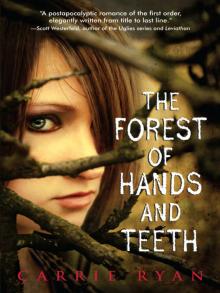 The Forest of Hands and Teeth
The Forest of Hands and Teeth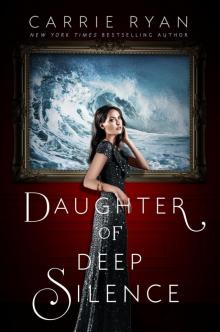 Daughter of Deep Silence
Daughter of Deep Silence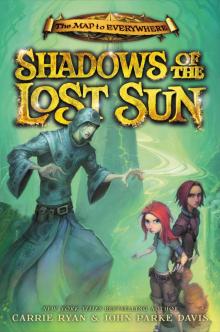 Shadows of the Lost Sun
Shadows of the Lost Sun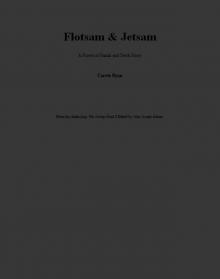 Flotsam & Jetsam
Flotsam & Jetsam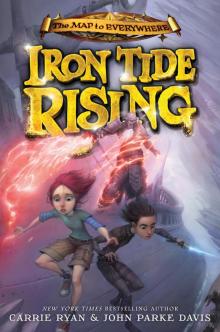 Iron Tide Rising
Iron Tide Rising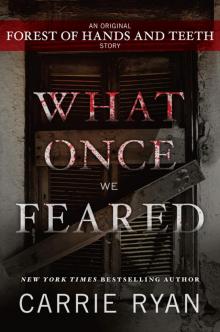 What Once We Feared
What Once We Feared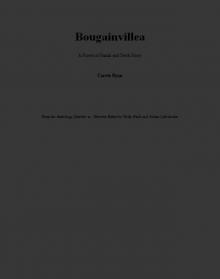 Bougainvillea
Bougainvillea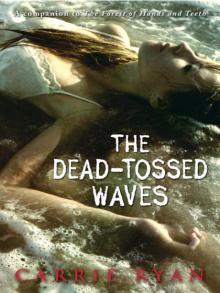 The Dead-Tossed Waves
The Dead-Tossed Waves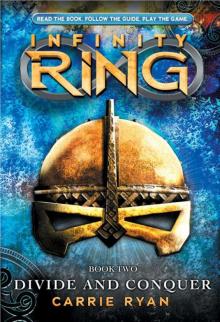 Divide and Conquer
Divide and Conquer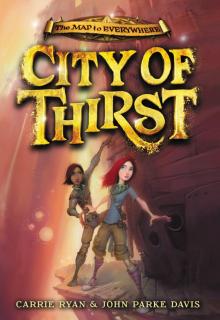 City of Thirst
City of Thirst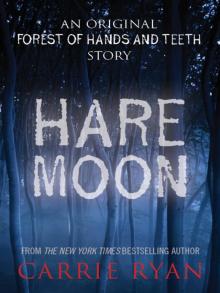 Hare Moon
Hare Moon Foretold: 14 Tales of Prophecy and Prediction
Foretold: 14 Tales of Prophecy and Prediction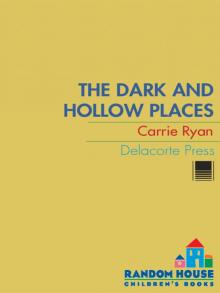 The Dark and Hollow Places
The Dark and Hollow Places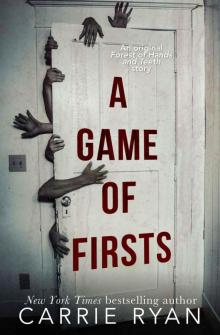 A Game of Firsts (The Forest of Hands and Teeth)
A Game of Firsts (The Forest of Hands and Teeth)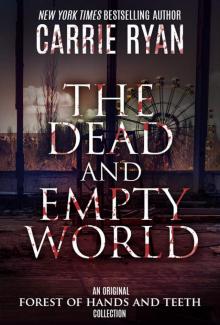 The Dead and Empty World
The Dead and Empty World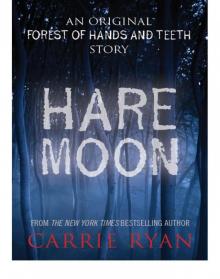 Forest SS - Hare Moon
Forest SS - Hare Moon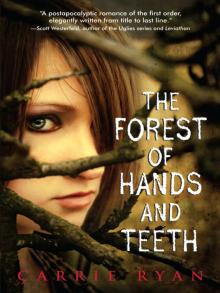 The Forest of Hands and Teeth Book 1
The Forest of Hands and Teeth Book 1 Foretold
Foretold